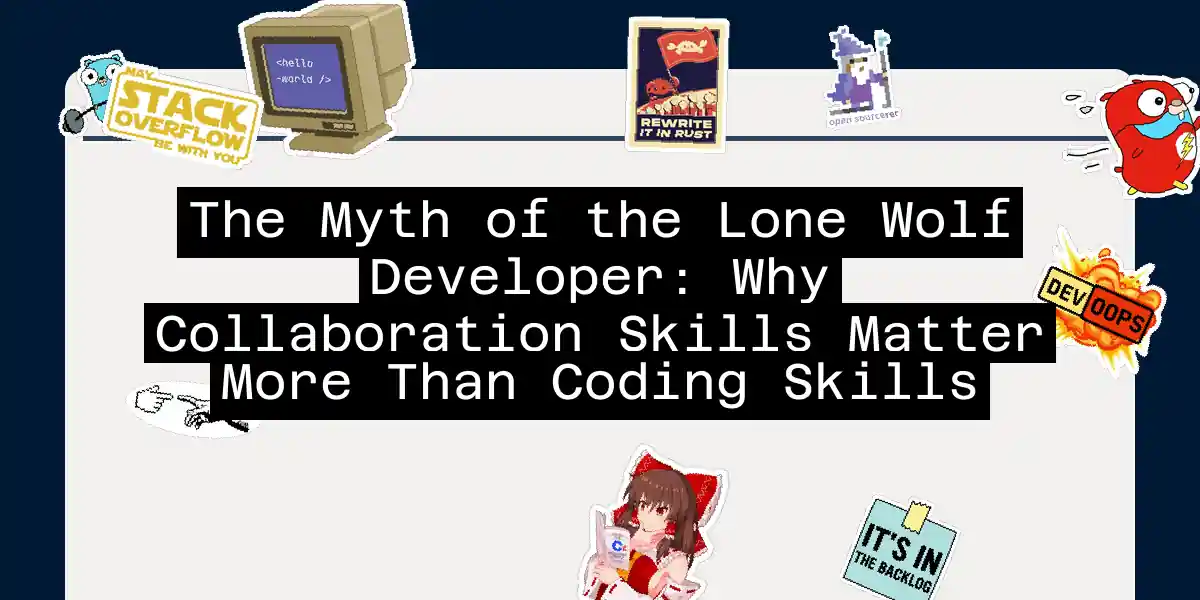Picture this: a dimly lit room, the soft glow of multiple monitors, and a solitary figure hunched over a keyboard, fingers flying as they single-handedly save the world through code. Sounds familiar? If you’re thinking, “Hey, that’s the plot of every hacker movie ever,” you’re not wrong. But here’s the kicker – it’s about as realistic as expecting your computer to make you a sandwich when you hit Ctrl+Alt+Delicious.
The Myth of the Coding Hermit
Let’s face it, we’ve all dreamed of being that lone wolf developer at some point. I know I have – there was a time when I thought I could conquer the coding world armed with nothing but my trusty laptop and an unhealthy amount of caffeine. Spoiler alert: it didn’t end well. My code looked like it had been written by a caffeinated squirrel, and my only collaborator was my increasingly concerned houseplant.
Reality Check: Software Development is a Team Sport
Here’s the thing about software development – it’s less “lone wolf” and more “wolf pack.” (And no, I’m not talking about the “Hangover” movies, though sometimes project deadlines can feel just as chaotic.) Real-world software projects are like a complex jigsaw puzzle, except the pieces keep changing shape, and someone’s always misplaced the box with the picture on it.
The Perils of Going Solo
Now, don’t get me wrong – there’s nothing inherently wrong with working alone. Heck, some of my best code has been written at 2 AM while in my pajamas. But making it a habit? That’s where things get dicey. Let’s break it down:
Knowledge Hoarding: Ever met someone who treats their code like Gollum treats the One Ring? Yeah, that’s not healthy for anyone involved.
Tunnel Vision: When you work alone, your perspective can become as narrow as a programmer’s social life during crunch time. (I kid, I kid… sort of.)
Technical Debt: It’s like credit card debt, but instead of owing money, you owe your future self hours of headaches trying to decipher your own code.
Ego Tripping: Nothing says “I’m insecure about my skills” quite like refusing to let anyone else look at your code.
The Power of Collaboration (or: Why Two Heads Are Better Than One, Even If One Is a Rubber Duck)
Collaboration isn’t just a buzzword to make HR feel good – it’s the secret sauce of successful software development. Here’s why:
- Knowledge Sharing: It’s like a potluck, but instead of casseroles, you’re sharing coding tricks and tips.
- Diverse Perspectives: Because sometimes, you need someone to tell you that your brilliant idea might not be so brilliant after all.
- Faster Problem Solving: Why bang your head against the wall alone when you can do it with friends?
- Better Code Quality: Because “It works on my machine” isn’t a valid excuse in a team environment.
- Continuous Learning: Every day is a school day when you’re working with others!
How to Embrace Your Inner Pack Animal
Ready to ditch the lone wolf act? Here are some practical steps:
- Open Up: Create an environment where asking for help isn’t seen as a weakness. (Pro tip: Bribing with snacks always works.)
- Tool Up: Embrace collaboration tools. Your team chat isn’t just for sharing memes… although that’s important too.
- Review and Be Reviewed: Code reviews aren’t personal attacks – think of them as free lessons.
- Mentor and Be Mentored: Remember, even Yoda was a padawan once.
- Celebrate Together: Because nothing builds team spirit quite like a collective sigh of relief after a successful deployment.
The Final Commit
In the end, the myth of the lone wolf developer is just that – a myth. Real software development is a collaborative effort, filled with shared victories, collective facepalms, and the occasional group debugging session that feels more like an exorcism.
So, the next time you’re tempted to go full hermit mode, remember: in the world of coding, the lone wolf doesn’t win – the pack does. Now, if you’ll excuse me, I need to go apologize to my houseplant for all those lonely nights of rubber duck debugging.
